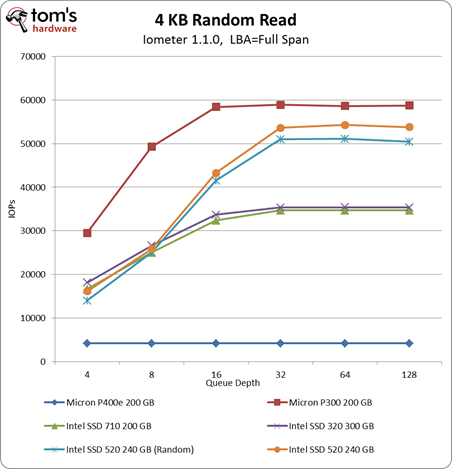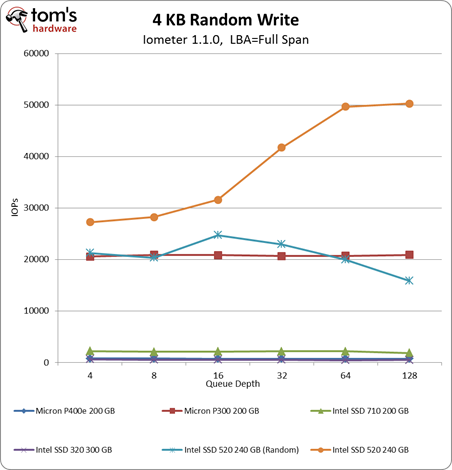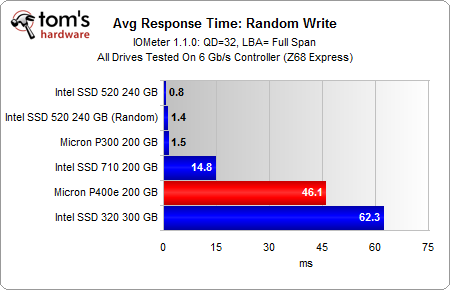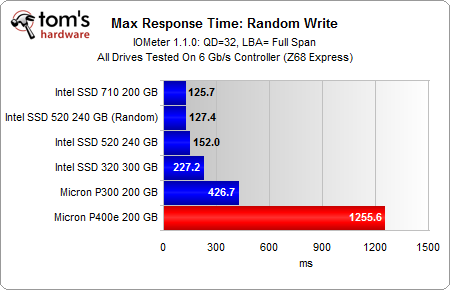Micron's RealSSD P400e: Affordable SSD Storage For The Enterprise?
4 KB Random Performance
Testing Preface
SSDs have many operational quirks and idiosyncrasies. Some of these peculiarities can be overlooked in a mainstream desktop environment, but are intolerable somewhere like a data center. Enterprise-oriented SSDs are also subjected to high-stress workloads for hours at a time, requiring a different test methodology than consumer SSDs (see Benchmarking For The Enterprise: A Whole New World), which is why we're preconditioning our test subjects using the following two scenarios:
- 4 KB random, database, file server, and Web server tests: we write 3x full capacity of the drive using random writes.
- 128 KB sequential tests: we write 3x full capacity of the drive sequentially.
4 KB Random
Micron's 200 GB P400e is rated for 50 000 4K random read IOPS, but it falls far behind in this test after settling into a steady state. The drive seems to have a particularly hard time recovering after being hammered with random writes, and plateaus to a ~4000 IOPS, even after plenty of idle time to recover.
Intel’s SSDs are a popular choice in the business world (that's not our opinion; it's a fact based on discussions with multiple data centers presented in Investigation: Is Your SSD More Reliable Than A Hard Drive?). We know that certain desktop-oriented models are even being used in server environments where they can be swapped out in the event of a failure. Therefore, we thought it fitting to include Intel's SSD 320, SSD 520, and SSD 710 for comparison.
Interestingly, the SandForce controller-based SSD 520 achieves up to 50 000 IOPS using Intel's binned MLC flash. That falls shy of the SLC-equipped P300, but it is a substantial improvement over the SSD 320 and more business-oriented SSD 710. When we test the drive with incompressible data (the turquoise line), SSD 520's performance doesn't change much, letting us know that SandForce's reliance on compression for optimal performance doesn't really affect reads.
The P400e claims to achieve up to 7000 random 4 KB write IOPS. According to our Iometer testing, actual performance actually falls between 700-750 IOPS after preconditioning. Though that's pretty low compared to some of the drives it competes against, it's still fast enough to beat Intel's 300 GB SSD 320. The more enterprise-oriented SSD 710 fares a little better, achieving about 2100 IOPS at all queue depths. In contrast, Micron's SLC-based P300 does really well, cresting 20 000 IOPS.
Get Tom's Hardware's best news and in-depth reviews, straight to your inbox.
SandForce's second-gen controller deserves some serious credit for giving Intel's SSD 520 the performance it demonstrates in this test. At a queue depth of 64, the desktop-class drive achieves just over 50 000 IOPS.
Arriving at a steady state for the 4 KB random I/O test, the P400e's average response time of 46.1 ms is just slightly quicker than Intel's SSD 320 at 62.3 ms. The more enterprise-oriented SSD 710 responds faster on average at 14.8 ms.
The rankings change considerably when we look to maximum response times. The P400e's 1255.6 ms result tosses it to the back of the pack. This high number suggests that Micron's P400e suffers when I/O requests overwhelm the SSD under write heavy conditions.
Though our emphasis is on enterprise-class storage, Intel's relatively new SSD 520 delivers another surprise. Depending on data type, the 520's maximum response time falls between ~125-155 ms, putting it on par with Intel's SSD 710.
Current page: 4 KB Random Performance
Prev Page Test Setup And Benchmarks Next Page 128 KB And 2 MB Sequential Performance-
ethanolson I wonder if the poor performance is part of some mechanism that ensure higher reliability. Maybe lower read and write voltage increase endurance but take longer to populate the cell with the appropriate charge level.Reply
Just sayin'. -
mayankleoboy1 ReplyRelease Date: 04/11/2012
Firmware for the m4 SSD is being updated from version 0309 to 000F. The m4 is updatable to this new firmware starting from versions 0001, 0002, 0009, or 0309 in a single step. If updating from an early version directly to 000F, all interim improvements will also be include.
Changes between version 0309 and 000F include the following changes:
Improved compatibility with certain SAS expanders and peripheral RAID cards.
Improved throughput stability under extremely heavy workloads.
Improved data protection in the event of unexpected, asynchronous power loss.
This firmware update is recommended for all drives currently in the field if the end user is experiencing any of these symptoms.
m4 firmware updated to a newer version. -
jaquith Seems like the perfect SSD for a third-rate data center and not mine.Reply
If SoftLayer (f/k/a ThePlanet) wants to lower their standards then good for them, and perhaps they need yet another law suit or reevaluate their published up-time with some more asterix *. -
lutel The only thing that is important for me is full disk encryption in desktop environment. Unfortunately Intel completly forgot and since Q66 chipset there is no mainboard supporting FDE with SSDs. Q77 probably could support it, but there is no BIOS that has "hard disk / ATA password" option. Intel, wake up!!!Reply -
cknobman Not impressed at all. I dont really see one redeeming feature this drive has that would get it chosen over many other SSD's on the market.Reply -
Is it just me or do I notice that we really need to SAVE SLC from extinction? I mean, naturally high performance (compression or none), better temperature control, and higher longevity are the greatest features of SLC - good for the environment, pocketbooks, and peace of mind long term. Anyone?Reply



